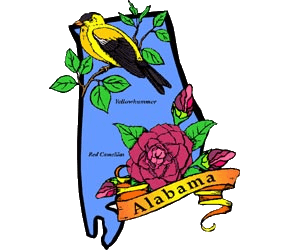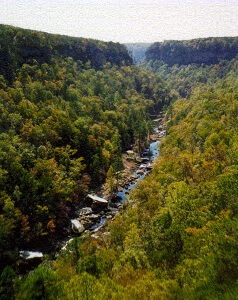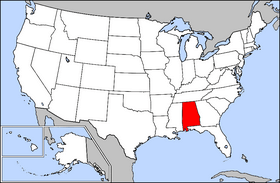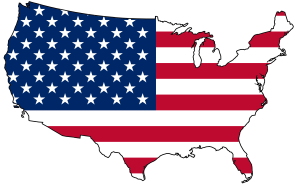Alabama-- School-Age
Alabama
22nd State (December 14, 1819), the southeastern U.S.
State Abbreviation: AL
Capital: Montgomery
Nickname: The Yellowhammer State, The Heart of Dixie, The Cotton State
Origin of Name: Choctaw tongue, translates the name as thicket clearers.
Motto: Audemus jura nostra defendere - We Dare Defend Our Rights
Size: 52,423 square miles Encyclopedia of Alabama
Alabama State Symbols
Alabama: State Seal
Bird: Yellowhammer
Dance: Square Dance
Fish-Fresh Water: Largemouth Bass
Fish-Salt Water: Tarpon
Fossil: Basilosaurus cetoides

Flower: Camellia
Gemstone: Star Blue Quartz
Horse: Racking Horse
Insect: Monarch
Butterfly
Mammal: Black Bear
Mineral: Hematite
Nut: Pecan
Rock: Marble
Shell: Scaphella junonia johnstoneae
Song: Alabama
Tree: Southern Longleaf Pine
Wildflower: Oak-leaf Hydrangea
Video
Things to Know
Alabama's history stretches back to the time when American Indian peoples inhabited Russell Cave. Alabama was home to the Creek Indians. The first known European explorers were of Spanish descent and arrived at in the 1500s, and later the French and English settled here.
After the French and Indian War (1763) France gave its territory to England, but Spain held claim to the territory around Mobile.
In 1783, which officially ended the American Revolution, Spain gained Mobile, and the new United States received the rest of the present-day state. America in 1813 claimed Mobile as a part of the Louisiana Purchase of 1803, and drove the Spanish out of the area.
The Creek Indians lost their hold on the land due to General Andrew Jackson.
Alabama was part of the Confederacy during the Civil War. In 1965, the Civil Rights Movement got its start in Montgomery when Rosa Parks refused to give up her seat to a white person.
United States Senators from Alabama.
Major Rivers: Tombigbee River, Alabama River, Tennessee River, Chattahoochee River.
The deepest gorge in the U.S. east of the Rockies is at Little River Canyon near Fort Payne, Alabama.

Little River Canyon
Dothan Alabama is the Peanut Capital of the World. Fifty percent of all the peanuts produced in the U.S. are grown within 100 miles of Dothan.
The Boll Weevil Monument
The only memorial in the world which glorifies a pest - the Mexican Boll Weevil is located in Enterprise, Alabama.
Before and after the Civil War, Alabama's economy depended primarily on the cotton industry. In 1915, the boll weevil, which infests cotton plants, began to destroy cotton crops. Farmers had to find other ways to make a living. Some began to raise livestock and crops other than cotton. Others turned to industry, building factories that manufactured a number of products.
What Are The Biggest Industries In Alabama?
A Look at Alabama Agriculture pdf AG Classroom
Famous Alabamians
Helen Keller, 1880-1968, author and educator about blindness
Coretta Scott King 1924-2006
Civil rights leader (with her husband, Martin Luther King, Jr.).
Jesse Owens 1913-1980
Track-and-field athlete who won four gold medals at the 1936 Olympic Games.
Rosa Parks, 1913-2005
Civil rights leader who refused to give up her bus seat to a white man, Tuskegee.
Hank Aaron, 1934
An American baseball player and member of the Baseball Hall of Fame. Aaron is best known for setting the Major League Baseball record for most home runs in a career (755).
Tuscaloosa, Choctaw chief
William Weatherford (Red Eagle) Creek Indian leader
Sites to See
Alabama Coloring Page Crayola
The world's largest motorcycle museum, the Barber Vintage Motor sports Museum in Birmingham, Alabama.









